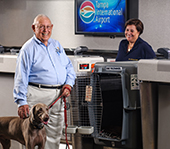Weather Delays Happen—Even for Pets—Tips to Weather the Storms. 2023 has been peppered with weather-related airline delays so far. Pet parents traveling with their pets in the passenger cabin and pets relocating to their new homes in temperature-controlled air cargo areas can be delayed by weather.
“Generally, pets under 22 pounds (10 kgs.) may travel in the passenger cabin. Larger pets travel in air cargo,” advised Walter M. Woolf, VMD, founder and CEO of Air Animal Pet Movers. “Many U.S. and international airlines only accept pets for air cargo transport when air temperatures are between 45 and 85 degrees Fahrenheit (7 to 27 degrees Celsius) at origin, all transit points and the destination. These regulations assure pet safety.”
As a result, airlines cancel flights when temperatures along the route are below or above this window. If that happens. Air Animal’s team works with their clients and the airlines to re-book flights. As with delayed flights for people, out-of-pocket expenses may be required.”
Blizzards, cold snaps, storms and heat waves can cause havoc with carefully planned and anticipated pet moves. “We do all we can to plan ahead, but piloting the planes and controlling the weather are beyond our service package.”
Weather Delay Tips
Passenger
Cabin
- When traveling with a pet in the passenger cabin, reduce
food intake the day before travel.
- Bring along a collapsible water bowl and a small bag
of the pet’s favorite treats along with a leash.
- Offer water often between flights and treats
sparingly to avoid messes in the flight kennel.
- Research locations for all Service Animal Relief Areas in each airport along the route.
Air Cargo
- For pets traveling air cargo, reduce food intake the day before travel.
- Freeze water in the flight kennel bowls and add them to the kennel at air cargo.
- Add a T-shirt used by the pet’s favorite person or small comfort blanket to the kennel.
- Add cut up newsprint or newspapers to pad the kennel and help absorb accidents.
- Pack a small bag of the pet’s favorite treats in the human’s carry-on to treat the pet for entering the kennel and to say hi at the destination.
Pets and flight kennels are not always clean when they arrive after long flights or weather delays. A quick, pre-planned trip to a local groomer is a good idea for longer post-flight car trips. We have more quick links for pet parents moving or traveling with their pets for the first time.

